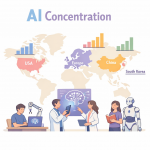Artificial Intelligence (AI) is no longer just for software developers or computer scientists. From business managers and educators to healthcare professionals and marketers, AI is transforming how industries operate. The myth that you must be a programmer or have advanced technical skills to understand AI is outdated. Today, AI learning resources, platforms, and structured training make it possible for non-tech professionals to upskill and stay competitive in the modern workplace.
In this blog, we’ll explore why AI matters, what non-tech professionals should focus on, where to start, and how to learn AI without writing a single line of code (Refer).
Why Should Non-Tech Professionals Learn AI
AI is everywhere—from chatbots on websites to fraud detection in banking and recommendation engines in e-commerce. For non-tech professionals, learning AI doesn’t mean building complex algorithms; it means understanding how AI tools work and how to use them effectively.
- Relevance to Jobs: Marketing professionals use AI for consumer insights, market segmentation, HR managers apply AI to automate job postings, screen candidates, and teachers adopt AI tools for personalized learning (1)
- Career Growth: Adding AI knowledge enhances resumes and opens up leadership opportunities.
- Future-proof Skills: As automation expands, understanding AI ensures professionals remain adaptable, and it could help one stay competitive.
Key Focus Areas for Non-Tech Learners
If you don’t have a programming background, the goal is not to learn coding but to build AI literacy. Here are areas to focus on:
- AI Fundamentals
- What AI is and what it is not.
- Understanding Machine Learning, Deep Learning, and Natural Language Processing at a conceptual level.
- Applications of AI in Your Domain
- Business: Customer analytics, sales forecasting.
- Healthcare: Diagnostics, patient data management.
- Education: Personalized learning platforms.
- Finance: Credit scoring, fraud detection.
- Tools and Platforms That Don’t Require Coding
- Google AutoML, Microsoft Azure Cognitive Services, IBM Watson, and ChatGPT.
- These platforms let you experiment with AI models using intuitive drag-and-drop interfaces.
- Ethical Use of AI
- Understanding bias, transparency, and accountability in AI-driven decisions.
How to Start Learning AI Without Coding
1. Take Beginner-Friendly Online Courses
- Coursera’s “AI for Everyone” by Andrew Ng: Explains AI concepts for business and society.
- Udemy & EdX: Offer non-technical AI courses tailored to industry professionals.
- Kapdec Resources: Provide structured learning paths for professionals, aligning with real-world needs.
2. Experiment With AI Tools
- Try AI-powered analytics platforms like Tableau with AI features.
- Use ChatGPT or Jasper for text-based assistance.
- Test image recognition or speech-to-text APIs without coding.
3. Read Case Studies in Your Field
Learning how others in your industry adopt AI provides context and inspiration.
4. Build AI Literacy With Communities and Webinars
Join forums like AI4ALL, LinkedIn groups, or professional webinars that simplify AI concepts for non-tech people.
Where Programming Is NOT Needed
- Using AI chatbots for customer service.
- Applying AI-driven marketing tools for ad targeting.
- Leveraging AI-powered HR tools for talent acquisition.
- Using predictive models built into business platforms (Salesforce, HubSpot, etc.).
Where a Basic Technical Understanding Helps
While you don’t need to code, a basic comfort with data and logic is valuable. Knowing how datasets work, what an algorithm means, and why bias occurs will make you a smarter AI user.
Challenges Non-Tech Professionals May Face
- Overwhelming Jargon: Terms like “neural networks” can intimidate. → Solution: Use beginner resources.
- Choosing the Right Tools: Too many AI products in the market. → Solution: Focus on industry-relevant tools.
- Ethical Concerns: Fear of AI replacing jobs. → Solution: Learn how AI enhances, not replaces, roles.
FAQ’s
Can I really learn AI without programming knowledge?
Yes. Many AI learning paths today are designed for non-programmers. With the help of no-code AI tools, visual platforms, and user-friendly software, you can build and test AI models without writing a single line of code. For example, tools like Google AutoML, IBM Watson, and ChatGPT-powered apps allow professionals to use AI practically without a technical background.
What are the first steps to start learning AI as a non-tech professional?
Start with basic AI concepts—like what machine learning is, how AI processes data, and where it is applied in real life. After that, explore no-code tools to practice hands-on AI applications. Finally, move to AI applications in your field (marketing, finance, healthcare, operations, etc.) to make your learning relevant and practical.
Do I need advanced math or statistics to understand AI?
No. While technical AI engineers rely on math for building algorithms, end-users and professionals only need conceptual understanding. For example, understanding that “AI identifies patterns in data” is more important than solving equations. Many visual dashboards and AI platforms explain results without exposing you to complex mathematics.
What are some beginner-friendly AI tools for non-tech professionals?
Google AutoML – Build models by uploading data.
Lobe (by Microsoft) – Drag-and-drop AI training.
ChatGPT & Copilot – AI-powered writing, coding, and research assistants.
MonkeyLearn – No-code text analysis.
Runway ML – AI for creative professionals (video, images, design).
These tools focus on usability rather than coding, making them ideal for beginners.
How can AI help in my career if I don’t want to become a developer?
AI can enhance your role without changing your profession. For instance:
Healthcare professionals can leverage AI for diagnostics and patient insights.
Instead of replacing you, AI acts as a productivity booster and decision-making assistant.
Marketers can use AI for campaign analysis and personalization.
Finance professionals can apply AI to fraud detection and risk analysis.
Teachers/trainers can adopt AI for personalized learning plans.
How much time does it take to learn AI basics without programming?
For most non-tech professionals, it takes 2–3 months of consistent learning (just a few hours a week) to understand AI basics and start using no-code platforms effectively. Courses from platforms like Coursera, Udemy, and Kapdec AI resources offer structured, easy-to-follow learning paths.
Where can I find resources to learn AI without coding?
You can explore:
YouTube tutorials – Free visual learning on no-code AI.
Kapdec AI Resources – Tailored guides for non-tech learners.
Coursera & edX – Beginner-friendly AI courses.
LinkedIn Learning – AI in business applications.
AI newsletters & blogs – For staying updated on trends.
Final Thoughts
Non-tech professionals don’t need to become coders to embrace AI. What matters is the ability to understand, interpret, and apply AI in practical contexts. By using beginner-friendly courses, experimenting with no-code platforms, and staying ethically mindful, you can transform your career with AI literacy as like Kapdec.
The future belongs to professionals who know how to leverage AI tools smartly, not just those who can code them.
REFRENCES
Teaching In The Age Of Artificial Intelligence And ChatGPT
Artificial Unintelligence: How Computers Misunderstand the World – Wikipedia


